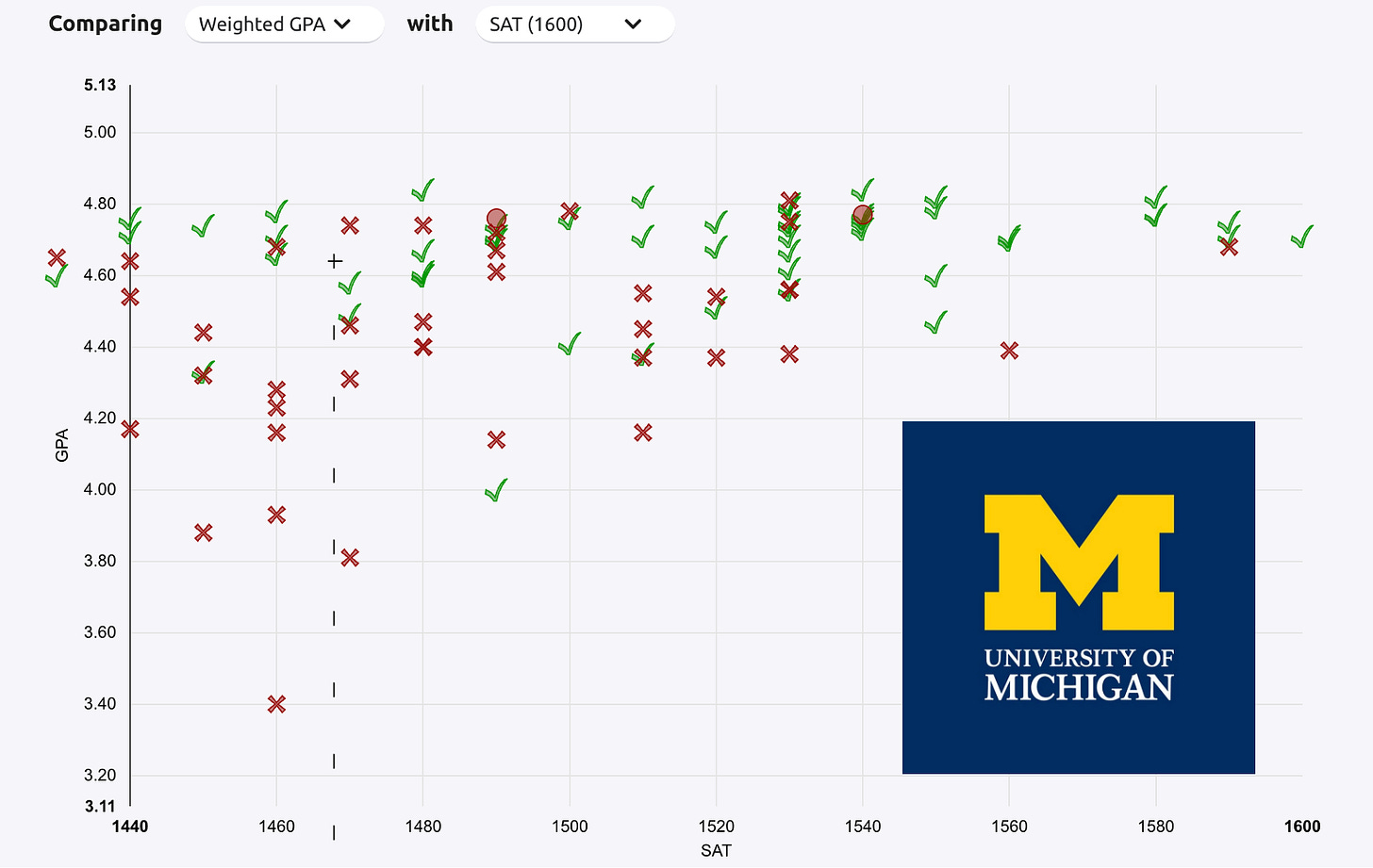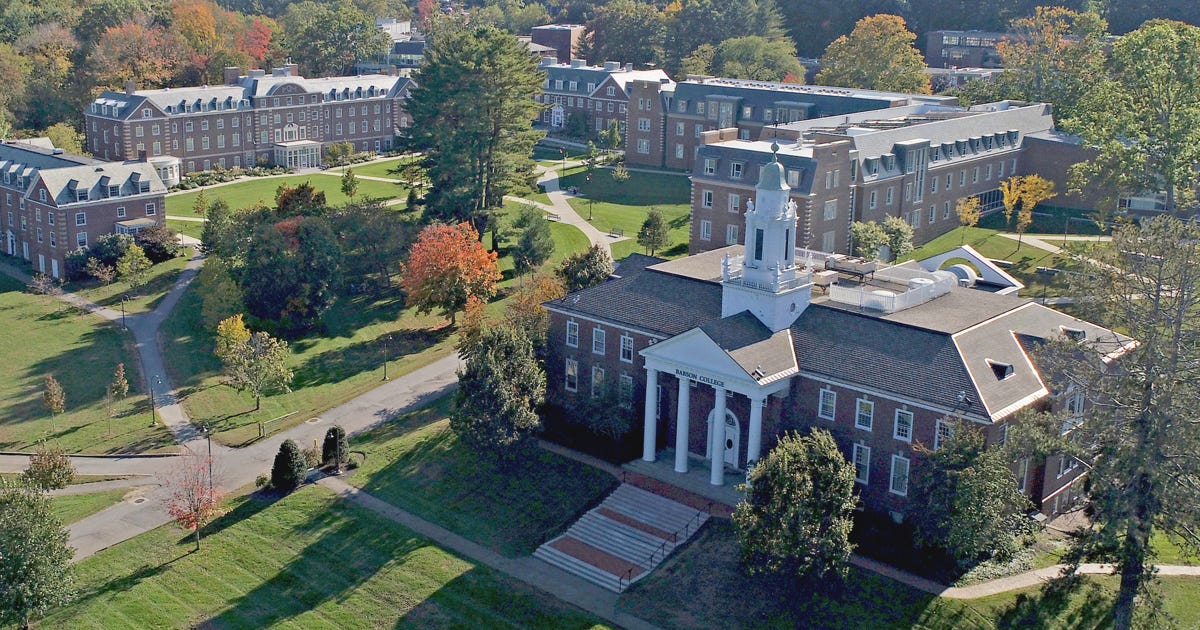Most Ivy-smart students aren't at Ivy-tier schools
(At least some of) the very smartest students aren't getting in, either
tl;dr
Granular evidence from my own high school indicates that many, and likely most, of the smartest students US college applicants (proxied by SAT) will get rejected from:
any particular top school they apply to
all of Harvard, Stanford, MIT, Yale, and Princeton (as an arbitrary example)
There’s more overlap between “great,” “good,” and “decent” schools in terms of students’ academic capability than one might expect (and I certainly expected), mostly because the top ~quarter of students at dozens of schools look pretty similar.
Therefore
The base rate of acceptance to any top US school among very top (99.5th+ percentile SAT-scoring, which is >median at all such schools) students, is low, maybe on the order of 20%; Phrased another way, using Princeton as a random example:P(smarter than avg Princeton student | attends Princeton)=.5<P(accepted to Princeton | apply, smarter than most Princeton students)
Scott Aaronson's rejection at 15, “from all five of "HYPMS" despite a 1600 SAT and a single-author paper in a major computer science conference” is an illustrative example, not an exception to it.
Intro
First, a few points to get out of the way:
1) High-minded (but totally sincere) disclaimer
Intelligence isn’t a moral virtue.
One’s intelligence is attributable almost entirely to luck of one kind or another, and thus is a form of privilege like any other.
In a more just world, being called “unintelligent” or even “stupid” wouldn’t bite any more than being called “colorblind,” and being told that you’re “brilliant” wouldn’t leave anyone gushing with pride.
2) No bullshit faux modesty
This post is neither about me nor for me, but it is inspired by my experience, and it would be silly and a bit disingenuous to pretend otherwise. In short:
My high school transcript was pretty damn good—almost as good as one can get in terms of grades, course rigor, and AP/SAT test scores.
I got rejected from all five Ivy-tier colleges to which I applied (and yes, I probably should have applied to more.)
3) This is (probably) totally fine - at least at the individual level
It at least might be totally appropriate that I got rejected; there’s no law that says colleges are “supposed” to be a ruthless academic meritocracy.
I personally find my own set of rejections mildly selfishly unfortunate, but not a moral injustice.
I got into some excellent colleges, including Georgetown, which is where I graduated a few months back and was extremely very fortunate to attend. Hoya Saxa!
I could be convinced that, in fact, it was some sort of personal injustice, but if so I’d nonetheless find it a relatively quite minor one.
Upper middle class ivy rejects like me are doing just fine.
Even at the societal level, such a blemish on the meritocratic veneer of higher education itself isn’t an issue. What might be, however, are individuals’ (e.g., high school me), groups’ (e.g., performance-focused organization) or society’s failure to grasp the situation. All this is to say that I’m trying to get some facts on the table so they can be recognized—not (necessarily) so they can be “corrected.”
4) A key assumption: test scores and intelligence
For this post, I’m going to take as given that:
SAT scores are a pretty good proxy for intelligence, and
Intelligence (even when proxied by a single number a lá IQ) is a meaningful and important individual-level characteristic.
A lot of ink has spilled on these topics, and I’m sure as hell not going to add anything important to those object-level debates ¯\_(ツ)_/¯
If you think this is wrong, this post is likely going to seem wrong or misguided. Sorry. Anyway, on to the substance!
Forbidden knowledge
I’m also writing this post because the information I’m going to present isn’t publicly available - at least to the best of my knowledge. I’m only able to access it because my Naviance account from high school
(somehow) hasn’t been disabled, and
gives me access to micro-level college admissions data from my high school (alone). Namely, I can see scatterplots like the one below of anonymized individuals’ (weighted) GPA + SAT/ACT scores and college application outcomes.
Secret questions
Search online, and you’ll find a thousand statistics tables detailing admissions rates and 25th and 75th SAT score percentiles for students. You’ll find that “selective” colleges are indeed quite selective, and that admissions rates have been falling over time.
You’ll also find that the students at top schools are really damn smart

So it’s easy to find info on students who did go to a particular school as well as on the high-level “competitiveness” of different colleges. So we can easily answer the question:
Given that Alex attended MIT, how smart is she likely to be?
But what you won’t find is data on the students who didn’t get into these Ivy-tier schools (or any schools, for that matter). In other words, I don’t know of any way of answering the question:
Given that Alex is as smart as the typical (or 75th percentile, or whatever) MIT (or wherever) student, how likely is she to get accepted to MIT conditional on applying?
Part 1) Bottom-up
Many (most?) of the best students still get rejected: evidence from one upper middle class white kid’s overachieving high school
Not really an unbiased sample, I know, but it’s what I’ve got.
Anyway, I reviewed the scatterplots corresponding to applications to Harvard, Princeton, Yale, MIT, and Stanford, and picked out those from students who:
Attended my high school, which is a good, reasonably racially diverse public school in a relatively wealthy area with an outsized share of overachievers.
Applied to college in the four years from 2018 to 2021
Had an SAT score of at least 1560 or ACT of at least 35,1 which:
Seem like pretty good proxies for intelligence
Correspond to about the 99.5th percentile among test takers
Are at around the 75th percentile for students attending the of the top-ranked schools in the U.S
Anyway, here’s what I found…
Findings
Unfortunately, the most important information can’t really be estimated from the data I have access to without making some big unjustified assumptions,2 so one number you won't find in the table above is “proportion of high-achievers who get into at least one of the five schools named conditional on applying to all” 3
That 42.4% bottom-line rejection (or 57.6% acceptance) rate is almost certainly optimistic, since Stanford and Yale are both looking for interesting, diverse applicants who will bring something unique to the table - not each choosing randomly from a hat. A “worse case” lower bound is the maximum single school acceptance rate, which in this data is Yale’s at 24%. Anyway, all things considered, I’d guesstimate the “true” all-school acceptance rate for this population of students at about 35%.
Graphs
Aaaand here they are. Sorry about the weird sizing; the tool isn’t super user-friendly.
All
Just the right column for easier viewing
And in case you want to zoom in even more, here’s a Drive link with the ten original, full-res images
Comparisons:
Here are a few plots for still-competitive-not-quite-Ivy colleges:

…and the most meritocratic school of all (which I very nearly decided to attend).
Part 2) Top-down
Where are Ivy rejects going instead? Lots of places.
Looking at the data (see e.g., here or here) you find that different sources give slightly different numbers. But one general theme jumps out regardless, which I’ll block quote for emphasis, as this is really the meat of the post:
Key findings
The top ranked ~10 “Ivy tier” schools distinguish themselves by enforcing significantly lower variance in student quality than other top ~50 schools, once one takes the scores of their 75th percentile-scoring student as given.
But, these 75th percentile Ivy students scored only very slightly better on the SAT than their counterparts at the next ~40ish schools. This means that:
≥25% of students at ~50 colleges scored at least as well as the median Harvard and Princeton student (1510 SAT). The best students at the top (at least) 50 schools have surprisingly similar academic credentials.
≥25% of students at ~85 (!) colleges (see link above) scored at least as well as the 25th percentile Harvard and Princeton students (1460).
The 75th percentile students at the 20th (or so)-highest scoring school (conveniently for me, Georgetown in the data I’m looking at) have SAT scores just 20 points below those of the best-scoring schools (1550 and 1570), which corresponds to raw score difference of about 2 questions (see here) on the 154-question SAT.
To beat a dead horse, make a guess:
What is the rank of the college whose 75th percentile SAT score is equal to Harvard’s 25th percentile?
I’ll give you one screen’s worth of space to actually try answering the question, with a few gifs to keep you entertained.
…..
…..
…..
…..
…..
…..
…..
…..
…..
…..
Answer: University of Maryland, College Park, ranked #59 according to the Powers that Be and with an acceptance rate just about 10x higher than Harvard’s at 49%. Even I was surprised to find this out just now!
Now let’s the other way, starting from what seems a reasonable representative for the old “good but not ~elite~” private universities, Tulane University (party capital of America-of-America—I can vouch4 in ~beautiful5~ New Orleans), and working our way toward the élite.

Don’t let the multi-day poly-drug Mardi Gras ragers fool you. Tulane students there are plenty smart, with 75% of them hitting ≥1360 on the SAT (91st percentile among test takers) and 25% getting ≥1470 (97th).
Where else might you find a good chunk of ~equally smart students (if not disposition)? You guessed it:
Yale (lower quartile of 1470)
Harvard (1460)
Princeton (1460)
What’s going on?
Best I can tell, the haphazard mix of statistics I’ve thrown at you basically fall out of those “key findings” bullet points above principle, which is presented here as a graphic6 instead:
More explicitly, the lower-level points I’m trying to convey are that:
I’m all but certain there are at least a few 1600-scoring students at all of the top, say, 50 U.S. colleges (and most of the top 100).
As we move down the rankings…
75th percentile SAT score falls very gradually
Median SAT score falls a bit faster
25th percentile score falls faster still
It’s surprisingly hard to find graphing-quality data, but I did manage to make this (hideous, I know) chart with non-made-up data for, well, read the title…

Conclusion
I have a bad habit of spending a ton of time on posts that never get haven’t yet been published, so I’ll avoid wasting both of our time reiterating the main points from the intro.
But I will emphasize once again that—as far as I can tell—there is a total lack of public data on applications by college, which stands in stark contrast to the cornucopia of statistics on college attendees by school.7
I don’t think it’s unhinged to suggest that this is simply because it’s not in colleges’ institutional interest to reveal how hard it is to get in. After all, high hopes→more applicants→more rejections→lower acceptance rate→move up in the all-important ~rankings~.
But it also clearly doesn’t help that doing what I’ve done in this post—that is, publicly lament how unfair life has been [recall from the intro: I don’t actually think this] because one’s high school academic success was followed by a string of Ivy rejections—is a little cringe. Well, consider this my sacrifice then, because the optimal amount of cringe is not zero.
Eyeballing the scatterplots, it doesn’t look like setting an SAT threshold of 1570-1600 or ACT threshold of 36 would change the results. I kept it at 1560 to preserve a decent sample size.
More specifically, it depends on how similar each school’s acceptance process is (or, more technically, the covariance of each distribution)
Or proportion who are accepted to any top-tier school, but five seemed like a reasonable number for me to manually look at
Tulane was my sister’s undergraduate home, which is why it jumped out to me.
And incredibly fucking hot and humid 24/7/365.



















Thanks so much for this post, Aaron!! It covers a lot that desperately needs to be better-known by nerdy kids in the US.
Story time: in 1997, I was rejected from all five of "HYPMS" despite a 1600 SAT and a single-author paper in a major computer science conference. (BUT: I was 15 years old, had uneven grades and no sports or music or "leadership," and indeed had "escaped" from high school early, getting a G.E.D. instead.) Once you understand how undergrad admissions work, this outcome wasn't surprising in the slightest, though at the time it felt like a death sentence.
I went to Cornell, one of two places (along with Carnegie Mellon) generous enough to admit me with this bizarre record. I got an excellent education there, and ended up at my first choice of PhD program (Berkeley).
Truthfully, in the long run the rejections may have helped me, by filling me with a burning motivation to do enough in science that someday the rejections would be a point of pride. And whenever I get depressed, I can tell myself that at least I can now cross that particular teenage fantasy off the list -- having, e.g., been tenured faculty at one of the same fine institutions (MIT) that rejected me for undergrad.
These days I run the Quantum Information Center at UT Austin, where almost every year I meet undergrads who I would've been thrilled to have at MIT.
I'm sharing this here because I hope some nerdy, academics-focused kid who feels like their life is over because they got rejected from HYPMS will read it, and it will mean something to them.
I had 1570/1600 on the SATs and a fair number of APs.
I actually ended up attending a liberal arts college that wasn't even the most well-known liberal arts college in Iowa. Like RulerofFranks, I'd note that I wasn't clearly the smartest person in my college, and several of my peers went and excelled at elite grad programs afterwards (I didn't).
I don't have nearly as stellar a record of intellectual success as Scott after college, but I think I performed reasonably well compared to most people I know at Ivy-tier places. Certainly by EA lights I've done activities that are more likely to be highly impactful, and I do not think I usually come across as dumb, even in highly selective settings.
I think one difference I notice between my younger self and the people from elite universities I interact with these days is that the elite university undergrads by and large come across as substantially more *mature* than I was at that age. I'm not sure how much this is a pattern, but in retrospect, there's a certain story where it makes sense that selecting on real-world (or deep extracurricular) success would by and large produce more emotionally/socially mature people than selecting on raw intellect or academic success.
Fortunately maturity is something that appears highly changeable with age. :P